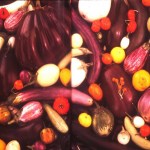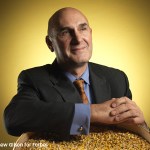
Eggplants are found in many colors: green, white, purple, yellow, even striped. They are shaped like cucumbers or apples. They are eaten in Italy as melanzane alla parmigiana, in France as ratatouille, and in the Middle East as baba ghanoush.
My husband Raoul usually grows Imperial Black Beauty, Rosa Bianca, and the hybrids Beatrice and Nadia. We cook them shortly after harvest:
Spicy Eggplant
2 Eggplants, diced into 1/2" cubes
3 tbsp Olive oil
1 Clove of garlic, smashed and chopped
1/2 tsp Chile flakes
1. Sauté smashed and chopped clove of garlic in the olive oil.
2. Add the chile flakes…
When I give lectures about the global food supply and the environment, often someone in the audience will comment that the best way to solve the problem is to quit producing so much food.
I find this type of "Let 'em starve" approach quite horrific from a humanitarian view. It also makes no sense scientifically.
First of all, it is well established that increases in economic and social development (think: enough food to eat) coincide with substantial declines in human fertility and population growth rates.
According to this recent article in Nature, "As a result of this close connection…
I hear it is snowing in 49 out of 50 states today. And this, just after the big snow in Washington. Is climate change to blame?
According to climate scientists, we cannot extrapolate based on the events of 1 week.
Still, even if we choose to discount the dramatic weather of this week, it is increasingly clear that the climate is changing and that we must rethink agriculture.
Population experts anticipate the addition of another roughly 3 billion people to the planet's population by mid-21st century. However, the amount of arable land has not changed appreciably in more than half a…
At the risk of offending half of the human race, I will say this: Men have no manners when it comes to cell phones.
I am traveling this week with plenty of time to pay attention to strangers, not that I have much of a choice. In the airport, men have cell phones pressed to their ears relaying critical information to their business partners such as "HI! I JUST LEFT YOU AN EMAIL AND A VOICE MAIL ABOUT THE DEAL THAT I HOPE TO DO IN THE NEXT 10 YEARS. I HOPE YOU GOT MY MESSAGE, I WILL CALL AGAIN BEFORE THE PLANE LEAVES AND AGAIN WHEN IT LANDS TO BE SURE YOU GOT MY MESSAGE."
And today in an…
Hunkered down in an elegant hotel in Washington DC, watching the epic storm continue unabated, I cannot help but think of award winning author Kim Stanley Robinson's "Fifty Degrees Below", the second novel in his three-part trilogy.
In this book, Washingtonians experience the most intense winter on record. As rigid temperatures shut down the city, the main character, Frank, is living in a treehouse in Rock Creek Park and heroic women scientists (I especially like that part) are trying to force the self-absorbed politicians to put in place effective policies to avert a global catastrophe. It…
Applications for the UK awards opened yesterday for the 2010 awards, where four women will be awarded a £15,000 fellowship to help with the scientific research. The awards are now in their 12th Entries can be made online, with an awards ceremony held in June.
The L'Oréal-UNESCO For Women in Science awards were the first international scientific awards dedicated to women and have become an international reference of scientific distinction - with two of the 2008 winners, Professor Ada Yonath and Professor Elizabeth Blackburn, going on to win Nobel Prizes in Chemistry and Medicine…
Roger Beachy has been attacked by some who feel that his willingness to fund work at his non-profit institute with Monsanto money will bias his work as director of NIFA.
John Tierney does not think so. Read his opinion piece
Read Emily Waltz' interview with Roger Beachy, the new director for the National Institute of Food and Agriculture (NIFA), the new research funding arm of the US Department of Agriculture (USDA).
What does Beachy's appoinment mean for researchers, farmers and consumers?
Larger, longer grants with more money for education or extension, so the knowledge can reach from the lab to the food to the fork; a stonger focus on sustinable approaches; and a regulatory stucture that is science based
We need to build enhanced capacity in the US to address urgent agricultural challenges such as sustainable…
"Eating with the fullest pleasure- pleasure, that is, that does not depend on ignorance- is perhaps the profoundest enactment of our connection with the world".
Wendell Berry
"Whether it's the science to slow global warming; the technology to protect our troops and confront bioterror and weapons of mass destruction; the research to find life-saving cures; or the innovations to remake our industries and create twenty-first century jobs--today, more than ever before, science holds the key to our survival as a planet and our security and prosperity as a nation." - President Barack Obama
At a time when our nation and our planet face unprecedented challenges, the sciences have a more important role to play in society than ever before. Yet today surprisingly few working…
Last year, I attended a Food Symposium at the Mountainfilm festival in Telluride.
Many of the speakers offered a simple solution to feeding the world in the face of a population that is expected to grow to 9.2 billion by the year 2050: Eat local.
But how much impact will the "locavore" movement really have on sustainable food production?
Not much, says James McWIlliams in his latest book "Just Food". "Eating local is not, in and of itself, a viable answer to sustainable food production on a global level."
"We should not delude ourselves into thinking that the relatively easy decision to…
In an interview with The Times, Gordon Conway, Professor of International Development at Imperial College London and a former government adviser said that the ban on organic farmers using GM crops was based on an excessively rigid rejection of synthetic approaches to farming and a misconception that natural ways were safer and more environment- friendly than man-made ones.
I completely agree with Gordon Conway that it makes sense for farmers to use the most powerful tools available to make their production more sustainable. Still, I think it unlikely in the short term that organic farmers…
The plot thickens.
Reuter's reports that DuPont submitted an 18-page report to the U.S. departments of justice and agriculture last Friday, alleging that Monsanto is unfairly using monopoly powers to drive up prices and defeat the competition. DuPont is asking U.S. regulators to force Monsanto to "rein in" its activities.
My fabulous former student Karl Haro von Mogel has just posted another one of his plant breeding videos, this time on tomato and potato breeding. Check it out!
The Long Now Foundation has a fabulous website where you can make predictions about the future that are societally or scientifically important.
Make a prediction or challenge a prediction.
My prediction is simply this:
"By 2020, GE crops will be grown on 10 fold more acreage than they are today, will be widely accepted by consumers and will have clearly benefited the goals of sustainable agriculture"
Sign on to challenge me to bet on this prediction!
Here is another interesting story about Monsanto, in Forbes magazine. The article manages to avoid calling Monsanto all good or all bad and instead looks at what Monsanto means for the future productivity of the global food supply.
Thanks to Alex Palazzo for alerting me to the article The Paranoid Style in American Science by Daniel Engber of Slate.
This is a three-part series on radical skepticism and the rise of conspiratorial thinking about science. Unfortunately it is all too familiar. As Alex notes, the series discusses how certain people (i.e. climate skeptics, the ID movement, and the tobacco industry) have cultivated a notion of super-skepticism in an attempt to discredit current scientific consensus. Sadly, crop genetic engineering has also often been the target of such attacks.
The book I wrote with my husband…
The word is spreading- we can feed the world without damaging it, if we can entertain some new ideas.
Check out Paul Voosen's article in the NYT and let me know what you think.






